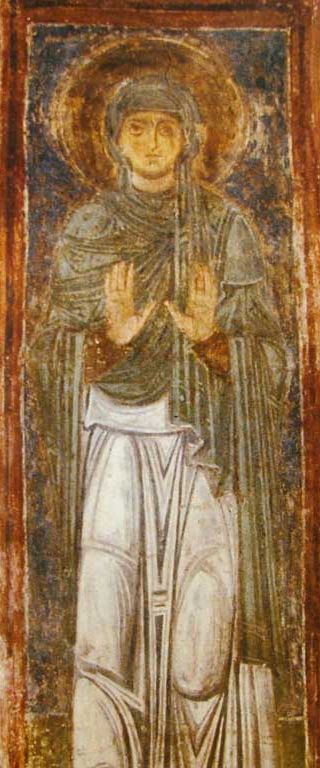
St. Macrina the Younger
Born: c. 327 CE
Died: July 19, 379 CE
Feast day: July 19
Her little brother, Saint Gregory of Nyssa, told everyone of her beauty; but in the long run it was her brains and her spirit that impressed him the most. Another brother, Saint Basil, borrowed her creative ideas on monastic life to craft his own monastic rule. While these brothers went on to become towering figures in the early church, their sister Macrina languishes in obscurity to this very day.
Born in 340, young Macrina was due to be married off in her teens when the young man suddenly died. Before her wealthy parents could line up another likely candidate, Macrina spotted a loophole to escape a marriage she had no interest in. She told her parents that she must keep faith with her absent husband, who was simply away on a journey to God. Her father, a skilled lawyer, must have been amused at his daughter’s resourcefulness; in any case her parents agreed to let her remain unmarried despite her many suitors.
When her father died, Macrina, as the eldest, became a “teacher in all things” to her brothers and sisters, especially in matters of faith, wrote Gregory in his biography of her.
Once the family was grown, Macrina persuaded her mother to set up a monastic community of women on one of the family’s estates. Here Macrina’s genius shone forth. Her ideas for a religious community differed radically from the communities then flourishing in the deserts of the Holy Land, where the members lived solitary lives and tried to outdo each other in harsh ascetic practices.
In Women in Church History, Joanne Turpin writes that Macrina’s community pioneered the monastic tradition of caring for the poor and hungry and abandoned, of reaching out to the broader community. “For example,” writes Turpin, “Macrina goes out and literally picks up women lying on the road in a state of starvation”; many of these women then stayed on to become members of the monastic community. Macrina began a hospital for the poor. And when famine struck, the needy knew they would not be turned away at the monastery. Gregory remarked that the large numbers of people coming and going made the hermitage seem like a city, certainly a novel idea at the time.
Macrina’s example stirred up her brothers’ imagination. Basil closed down his school of rhetoric and joined his sister in the monastic life for a number of years, writing a rule for community life that enabled Macrina’s ideas to live on for centuries. When he left the monastery to be ordained, he carried with him his sister’s zeal in caring for the poor and hungry. Gregory too became a priest, a famous heresy-fighter, and a leading theologian.
Like many older sisters, Macrina gave her brothers a piece of her mind when they got out of line. When she thought young Basil was getting “puffed up” with pride, she took pains to straighten out this future Father of the Church. Shortly before her death, Gregory came to visit his sister at the monastery to complain about his weighty duties in the church, settling disputes and battling heretical colleagues. The straight-talking Macrina told Gregory flatly that his fame was due not to his own greatness, but to the prayers of his parents “lifting you to the heights, since you have little or nothing within yourself to achieve this.” Gregory evidently appreciated this perspective, since he recorded it for the ages.
Macrina died in 379; crowds of mourners from all over the countryside streamed to her funeral.
Originally published in the January 1992 issue of Salt magazine, ©Claretian Publications.
Image: anonimus, Public Domain, via Wikimedia Commons






